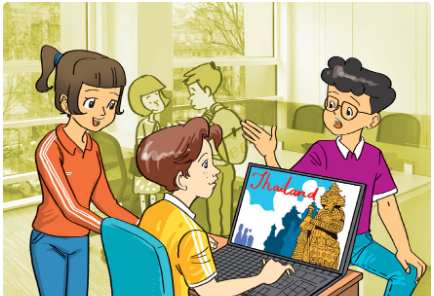Bài học cùng chủ đề
Báo cáo học liệu
Mua học liệu
Mua học liệu:
-
Số dư ví của bạn: 0 coin - 0 Xu
-
Nếu mua học liệu này bạn sẽ bị trừ: 2 coin\Xu
Để nhận Coin\Xu, bạn có thể:

Luyện tập SVIP
 |
DO YOU KNOW ... ? |
|
- We use the present perfect continuous with have / has been + -ing form of the verb for actions which started in the past and are still happening, or have only just finished. Examples: + I have been searching for information about further education for several days. + The playground is wet. It has been rainning. - The actions can be expressed by either the present perfect or the present perfect continuous with certain verbs: hope, learn, lie, live, look, rain, sleep, sit, snow, stand, stay, study, teach, wait, work. - The difference between the two tenses is that the present perfect focuses on the result of the action or event. Meanwhile, the present perfect continuous focuses on the action or event which may or may not be finished. Examples: + I have learnt a lot about it from different websites. (the action is completed) + I have been learning to drive. (the action is not completed) + I have read this book. (the action is completed) + I have been reading this book. (the action is not completed) - The present perfect continuous can also express an action which is not interrupted. If we mention the number of times an action has been repeated, we use the present perfect. Examples: + I have been writing emails all afternoon. + I have written ten emails this afternoon. |
- Chúng ta sử dụng thì hiện tại hoàn thành tiếp diễn với dạng have / has been + -ing của động từ cho các hành động bắt đầu trong quá khứ và vẫn đang xảy ra, hoặc chỉ vừa kết thúc. Ví dụ: + Tôi đã tìm kiếm thông tin về giáo dục xa hơn trong vài ngày. + Sân chơi thì ẩm ướt. Trời vừa mưa. - Các hành động có thể được thể hiện bằng thì hiện tại hoàn thành hoặc thì hiện tại hoàn thành tiếp diễn với các động từ nhất định: hope, learn, lie, live, look, rain, sleep, sit, snow, stand, stay, study, teach, wait, work. - Sự khác biệt giữa hai thì là hiện tại hoàn thành tập trung vào kết quả của hành động hoặc sự việc. Trong khi đó, hiện tại hoàn thành tiếp diễn tập trung vào hành động hoặc sự việc có thể hoặc không thể kết thúc. Ví dụ: + Tôi đã học được rất nhiều về nó từ các trang web khác nhau. (hành động đã hoàn thành) + Tôi vừa được học lái xe. (hành động chưa hoàn thành) + Tôi đã đọc cuốn sách này rồi. (hành động đã hoàn thành) + Tôi vừa đọc cuốn sách này. (hành động chưa hoàn thành) - Hiện tại hoàn thành tiếp diễn cũng có thể diễn tả một hành động không bị gián đoạn. Nếu chúng ta đề cập đến số lần một hành động được lặp lại, chúng ta sử dụng thì hiện tại hoàn thành. Ví dụ: - Tôi đã viết email cả buổi chiều. - Tôi đã viết mười email chiều nay. |
|
Phong: Hey, you've been in front of your computer for so long! What are you looking for? Kevin: Well, I've been searching for information about further education for several days and I've learnt a lot about it from different websites. Phong: What is further education? Kevin: It's basically education below degree level for people above school age. It can be academic or vocational. Maria: Sounds interesting! How are they different? Kevin: Academic courses help us develop analytical skills, critical thinking and knowledge for higher education at a university or college Phong: Will that lead to a bachelor's degree? Kevin: Exactly. That's the undergraduate level. At the postgraduate level, you get a master's degree, or a doctoral degree. A doctoral degree, also called a doctorate or PhD, is the highest university degree.
|
Maria: I see. What about vocational courses? Kevin: They provide us with practical skills, training and qualifications to succeed in a particular job. Maria: OK. So, what are your plans for the future? Kevin: I've been thinking about studying abroad lately. Besides improving my language skills, I can learn more about other cultures. It can be exciting. Phong: And more expensive... Kevin: But we can apply for scholarships. Maria: Well, I may need more time to decide on my major so I won't go straight to university after school. Kevin: Good idea! Many students prefer to take a gap year between secondary school and college so they can do voluntary work or internships, and travel. Maria: I couldn't agree more. I've travelled to quite a few countries since grade 9. Next year I plan to go to Thailand to work as a volunteer at a children's home. I hope the practical experience will make my CV look good. Phong: Sounds great! I'd like to join you if I can. I've have never been to Thailand before. |
Read the conversation again. Find the time expressions used with the verb forms below.
Put the verb in each sentence in the present perfect continuous.
1. Why don't you take a break? You (surf) the Internet all day.
2. When you travel to Thailand, you can stay at my uncle's flat. He (live) in Bangkok since he got married.
3. Nam's brother graduated from college last month and (look) for a job.
4. Kevin's friends (study) in Australia for a year. Their course will end in June.
5. Professor Richards, who is Dean of the Foreign Languages Faculty, (teach) in this university for more than ten years.
Choose the correct form of the verbs in brackets to complete the sentences.
1. I (have read/have been reading) three books on vocational training to complete this project.
2. I (have read/have been reading) a report on further education since last Monday. I will finish it this Sunday.
3. (Have you applied/Have you been applying) for the scholarship to study in Singapore?
Choose the correct form of the verbs in brackets to complete the sentences.
1. I (have waited/have been waiting) for the university's reply about entry requirements for a whole week. I hope to receive it soon.
2. Prof. Wilson (has given/has been giving) the same seminar to students for the last 12 years.
3. I (have never understood/have never been understanding) why so many young people want to study abroad.

Bạn có thể đăng câu hỏi về bài học này ở đây

